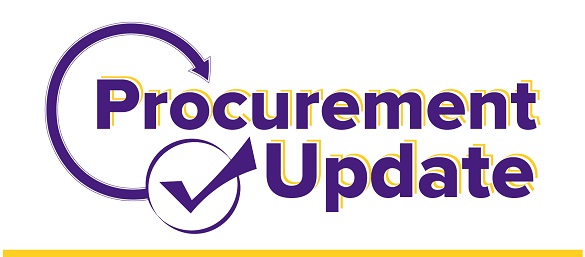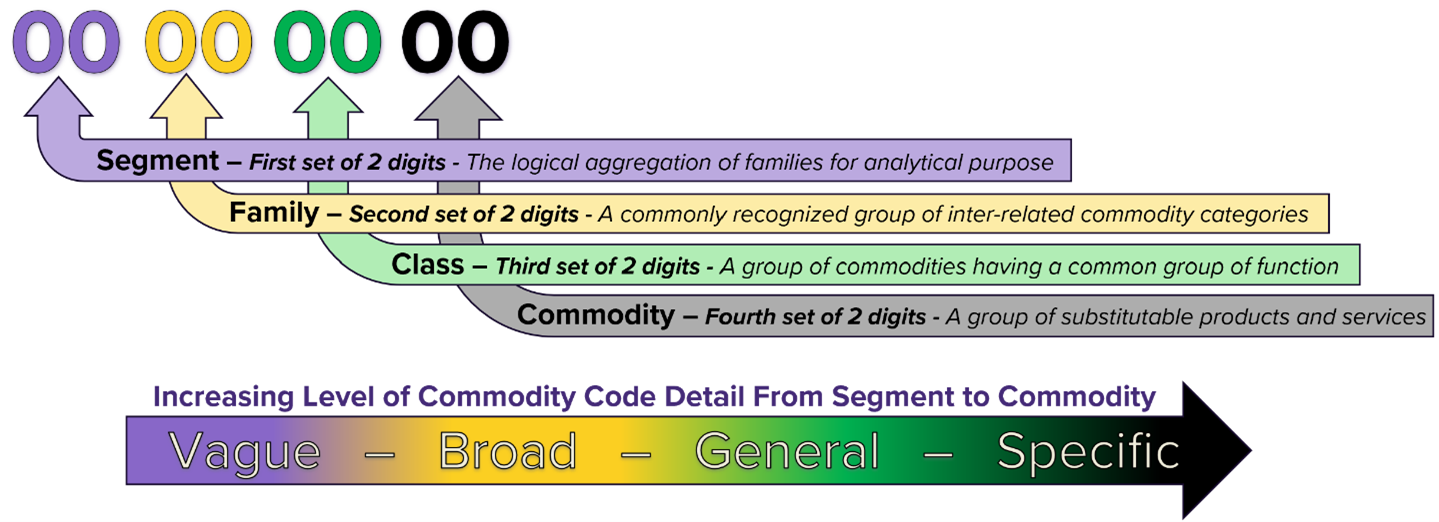|
May 2025

Procurement Recommendations to Mitigate Tariff Disruptions
|
|
|
|
As you may be aware, additional “reciprocal” tariffs were scheduled to go into place
April 9, 2025, on some products coming from overseas. President Trump has announced
a 90-day pause on those reciprocal tariffs, along with an increase to tariffs on Chinese
exports. On April 11, the Trump administration announced reciprocal tariffs will exclude
consumer electronics from most countries but retain a tariff on electronics from China.
The tariff situation is in flux, and it cannot be predicted when or if the situation
will stabilize.
LSU Procurement is actively exploring ways to mitigate the financial impact of these
tariffs. The most effective and actionable step for the LSU community is to prioritize
the use of strategically sourced agreements with LSU Master Contract suppliers.
We have established collaborative, long-term relationships with these suppliers, and
they are essential to our procurement strategy. By consolidating our spending, we
enhance the value of these partnerships and ensure continuity during this period of
instability.
LSU’s Master Contracts webpage outlines LSU system-wide contracts, including those for Workday punch-out catalogs/supplier
websites. Note: Tariffs may still apply to master contract items but may be at a lesser cost
than if sourced from a non-contracted supplier directly.
As we navigate the fluidity of our current state, in partnership with LSU General
Counsel, we have put together the guidance below of things to consider.
New Procurements
If you cannot utilize one of our strategic partners, consider the following:
- Suspending/delaying “non-essential” purchases.
- Assessing the impact of the potential cost changes.
- Ensuring tariff/duty costs are factored into price evaluations. Special attention
should be paid to non-competitive purchases that are close to the competitive threshold,
as tariff costs could cause the purchase to exceed the threshold, thus requiring competition.
Existing Contracts & Purchase Orders
Departments should conduct an analysis of all open purchase orders by dollar value
and commodity, origin and ready date. Contact Procurement to invoke cancellation/termination
should items no longer be needed.
LSU Procurement remains committed to helping you and your department with all purchasing
needs. If you have any questions, please email purchase@lsu.edu.
|
|
|
Workday Mass Cleanup Actions
|
|
|
|
Mass scheduled cancellation/close processes are necessary in order to help keep Workday
data current and the system operating efficiently.
|
|
|


Reminder: Immediately Report Stolen University Property
|
|
|
|
The safeguarding of university property is vital to maintaining a productive and efficient
environment for students, faculty, and staff. In the event of the theft of any university
property, action must be taken immediately as outlined below.
- Report to Law Enforcement: Notify the appropriate law enforcement agency to make a
formal report and initiate the investigation process (LSUPD for incidents occurring
on campus).
- Inform LSU Property Management: After reporting to law enforcement, immediately notify
LSU Property Management by emailing property@lsu.edu. Property Management will provide instructions on next steps.
Timely reporting helps us protect LSU's assets, recover stolen items, and take necessary
steps to prevent future incidents. Thank you for your diligence in helping to safeguard
university resources.
|
|
|
Supplier Contract Assignments
|
|
|
|
A Contract assignment is when one party transfers their contract rights and duties
to another party. At LSU, this often happens when a company is sold or merged. Other
reasons include:
- Bankruptcy or insolvency
- Change in service providers
- Financial transactions
- Legal requirements
LSU Procurement sets the rules for contracts that need assignment or other changes
due to a company name or tax ID change. These changes have legal effects and require
quick action and official documents to protect the University's interests.
Suppliers must notify the University in writing (on company letterhead or by email)
about any buyouts, acquisitions, or mergers. LSU Procurement will then take the necessary
actions. Until approved, the original supplier remains responsible for the contract
and receives any payments.
Suppliers cannot transfer their contract rights, obligations, or payments to another
party without LSU Procurement's written approval.
Departments can assist in this process by forwarding notices received to LSU Procurement
at suppliers@lsu.edu. The Supplier Support Team will handle the contract assignment process and notify
the department, Procurement buyer and supplier once the process is complete. Note: A new purchase order may be required; thus, invoice processing must be halted
during this process.
|
|
|
New/Renewed Master Contracts
|
|
|
- Staples - New contract with prompt payment terms (B2B catalog coming in FY26)
- Airgas - Renewed and renegotiated with prompt payment terms added
- SHI International - Renewed and renegotiated
|
|
|
Supplier Performance Scorecards & Survey
|
|
|
|
As a reminder, LSU Procurement is asking for your input in managing our contracted
suppliers through completing supplier performance surveys. This allows your voice
to be heard, to highlight any problem areas you have experienced with a supplier,
or to commend them for a job well done. There is a separate survey for each supplier
holding a master contract with the university. You are invited to complete the survey(s)
for any suppliers with which you have made purchases. The feedback will be shared
with the suppliers during their annual business reviews.
Survey responses will be collected through mid-June. Links to the supplier surveys
were sent out via email in April and are also accessible through our website.
|
|
|
Prompt Payment Terms/Early Payment Discounts
|
|
|
|
Kudos to you! LSU departments have retained $210,482.24 in their budgets for Fiscal Year 2025 YTD (7/1/2024 – 4/30/2025) by promptly receiving
and paying invoices.
Approximately $121,540.39 was lost by not paying within the prompt payment/early payment discount timeframe.
Departments are reminded to review deliveries and approve/process LSU master contract
and Workday B2B catalog supplier invoices timely.
|
|
|
|
As mentioned in the previous newsletter, LSU Procurement is working to implement United
Nations Standard Products and Services Code (UNSPSC) Commodity Code functionality
in Workday at the start of the new fiscal year (FY26). This is a standardized classification
system for goods and services, as published by the United Nations Development Program.
The classification structure is broken down into four (4) levels with each item listed
in the UNSPSC code having a unique 8-digit commodity code, as shown below. This will
allow for better spend tracking and visibility across the entire LSU system.
 Example: Example:
 Commodity codes will work in conjunction with spend categories to more accurately
categorize and describe what is being purchased by LSU end users. In addition to the
spend category, each line item (good or service) on a requisition will also now have
an 8-digit UNSPSC Commodity Code. Commodity codes will work in conjunction with spend categories to more accurately
categorize and describe what is being purchased by LSU end users. In addition to the
spend category, each line item (good or service) on a requisition will also now have
an 8-digit UNSPSC Commodity Code.
For most orders created from a Punch-out (B2B) Catalog Requisition, the UNSPSC code
will be automatically populated on the requisition. The UNSPSC Commodity Code for
line items (goods or services) created as a Non-Catalog Requisition must be manually
selected by the end user when creating the requisition.
LSU Procurement and ITS are creating a lookup tool/report in Workday that will allow
end users to search for the commodity code that is most appropriate for the good/service
they are purchasing. This lookup tool will also provide a suggested spend category(ies)
for each commodity code.
|
|
|
|
The link provided above to LSU Procurement training material “Categorizing Spend:
An Introduction to United Nations Standard Products and Services Code (UNSPSC) Commodity
Codes and How They are Used” will provide additional information on the UNSPSC Commodity
Code structure, benefits of using commodity codes, instructions for assigning commodity
codes on a requisition, and preliminary details on the Workday commodity code lookup
tool/report.
LSU Procurement continues to work with multiple departments to test and develop training/job
aid materials as we approach the release of this functionality. Additional information will be provided via Procurement Newsletters, Business Manager’s
Meeting, etc.
|
|
|
- Don't use "Office of Accounting Services" as the "Ship-To" address. Even though Workday allows it, you should list the actual delivery location or where
services are rendered for auditing purposes. The Requisition Sourcing Buyer won't
correct the address, and any requisitions with the accounting services address will
be returned to you.
- Draft receipts can cause issues with reconciliation and closing purchase orders. Workday
now prompts initiators to edit an existing draft receipt instead of creating a new
one. Users should either edit and submit the draft receipt or cancel it and start
over. Workday will remind you to submit or cancel draft receipts if they remain in
draft status for more than 2 days. Draft receipts older than 90 days will be automatically canceled by Procurement.
|
|
|
If you have an item you’d like to see included in a future edition of Procurement
Update, please email your suggestion to purchase@lsu.edu.
|